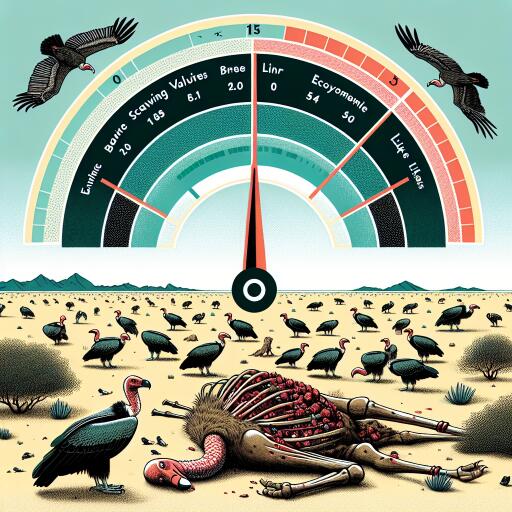
Measuring the Scavenging Value of Vultures: An Economic Insight into Conservation
The indispensable role of vultures in maintaining ecological balance and public health through their natural scavenging has come under the spotlight. Recent evaluations reveal the remarkable economic benefit of these avian scavengers in terms of carcass disposal, presenting a compelling case for their conservation through initiatives like captive breeding and release into designated safe zones.
The critical decline in vulture populations in India, primarily due to the toxic effects of the veterinary use of diclofenac on these birds, has highlighted their irreplaceable ecosystem service. Before this decline, vultures played a pivotal role in naturally disposing of millions of livestock carcasses annually. Their absence has not only led to a surge in feral dog populations and associated rabies cases but also impacted certain cultural practices adversely.
A study focusing on the economic feasibility of vulture conservation in India has spotlighted the financially savvy nature of investing in vulture breeding programs. The analysis juxtaposed the costs related to capturing breeding, establishing vulture safe zones, and operational expenses against the economic benefits of their scavenging services. It emerged that vultures, through their lifespan, provide a significant economic advantage by naturally processing carcasses, an essential service that would otherwise require the establishment of mechanized rendering plants.
Rendering plants, which are essential for converting waste animal tissue into usable byproducts, prove to be costly both in their setup and maintenance. By contrast, vultures, requiring no such infrastructure, offer a sustainable and cost-effective alternative. An estimated group of 600 vultures can match the daily carcass processing rate of a medium-sized rendering plant, emphasizing their value in urban and rural settings alike.
This understanding paves the way for innovative financial strategies to support vulture conservation. The concept of green bonds, for example, has been mooted as a means to funnel investment into biodiversity conservation, with a suggestion to extend this support to encompass ‘societal biodiversity,’ including species like vultures that directly benefit human communities and economies.
The creation of vulture safe zones, areas where the risk of poisoning and other threats is minimized, is central to these conservation efforts. These zones not only provide a haven for vultures but also serve as a bedrock for their breeding and reintroduction into the wild. The involvement of the Bombay Natural History Society and other conservation bodies in establishing these and breeding centers across India marks a significant step toward reviving vulture populations.
In conclusion, recognizing the economic value of vultures in the ecosystem underscores the importance of their conservation. The cost-effectiveness of natural scavenging services provided by vultures makes a compelling case for investment in their conservation, highlighting a rare intersection of ecological preservation and economic sense. As society progresses toward finding sustainable solutions to ecological challenges, the conservation of vultures emerges as a shining example of how understanding and investing in nature’s services can yield considerable benefits for the health of our planet and our economies.





Leave a Reply